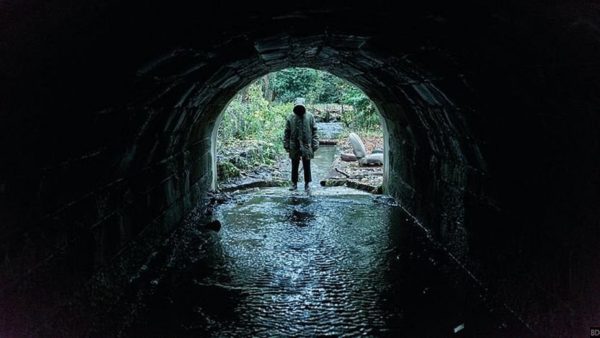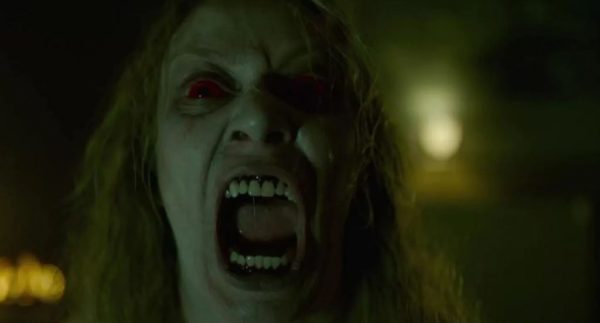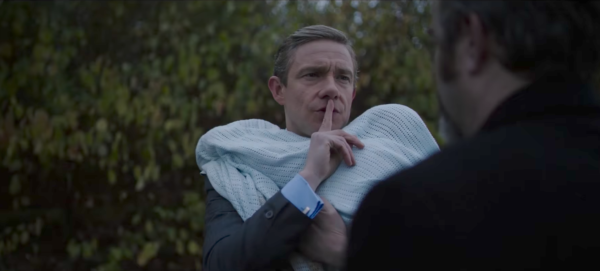
Theatrical staginess is both a boon and a curse for Ghost Stories, Jeremy Dyson & Andy Nyman’s film adaptation of their hit play.
Let’s bitch it out…
Horror is a peculiar beast. Currently there’s an odd contention about what constitutes a horror film and how we need to manage expectations when it comes to contemporary horror films (particularly those from indie stalwart distributor A24). There’s a myriad of technical approaches that directors and crews can utilize to emphasize scares or atmosphere or performance. Whether these choices are successful or not depends on the script and the intentionality – what best serves the finished film?
There’s an intentionality in raising these questions because Ghost Stories does some things really well…but there’s an undeniable tension between the uber-successful stage version of this story and this filmed adaptation. Unlike The Moose Head Over The Mantel, another recent film with theatrical elements, Ghost Stories struggles to escape from its stagey origins but never quite overcomes them. This is particularly evident in the film’s final, revelatory climactic sequence, which is ironic because it is the film’s integral set piece and likely Ghost Stories‘ single greatest talking point.

The film opens with Professor Goodman (Andy Nyman) debunking popular psychic Mark Van Rhys as part of his series, Psychic Cheats. Goodman takes obvious delight in exposing the popular psychic as a fraud, despite the clear suggestion that Van Rhys is providing a measure of relief to grieving families with his fiction. It’s a well-executed opening that offers invaluable insight into Goodman: he’s a man with a passion for exposing hoaxers and his dogged pursuit in exposing fraudulent supernatural cases dominates his life and (seemingly) his identity.
Goodman’s life is changed when he receives an invitation to visit Charles Cameron (Leonard Byrne), a once-famous, now reclusive, paranormal investigator. Cameron, near death, tasks Goodman to look into three cases that he was never able to debunk as a final act of kindness. The project divides the remainder of Ghost Stories into a defacto anthology.

The first case involves Tony Matthews (Paul Whitehouse), a night watchman working at an abandoned women’s asylum who encounters freaky noises. The second case features Simon Rifkind (Alex Lawther), a teenage boy driving without a license who hits something on an abandoned stretch of road. The final case concerns the challenging pregnancy and untimely death of Mike Pirddle (Martin Freeman)’s wife.
There’s a fair amount of repetition in the execution of each vignette: Goodman visits with the man at his home and hear his tale. The story is then recreated as though it is occurring in the present, a clear attempt to open the tale up using the visual properties of film as a medium. The aesthetic of the film is very welcoming, particularly its vivid colour design (the red lights of Simon’s car lights, the cool blues of Pirddle’s somber mansion) as well as Pirddle’s labyrinthian home full of shadowy stairwells and hallways, which lends the film a lush and gothic atmosphere.
Of the three stories, Freeman fares best, which is reasonable considering he is given more to do than his less well-known counterparts, the fact that his story is set in the most accessible location and he hangs around for the climax. There’s an undeniable feeling of stunt casting the popular actor to help bolster the film’s economic prospects, but Freeman makes it work because he digs into the role with relish and verve.
Unfortunately none the writing and the staging of the three stories is particularly innovative. They’re all pretty basic ghost stories, replete with slow, building tension and a weak jump scare at the end of each tale as a meek resolution. Ghost Stories excels at creating mood and tension, but there’s a distinct lack of payoff. It’s the equivalent of a solid, albeit unexceptional, story told around a campfire.
Which brings us to the climax. Without going into spoilers, the film’s end coalesces the disparate chapters in a single unifying way. The development will likely surprise casual viewers and reward those who have been paying attention to visual and verbal cues, but it is hardly the revelatory achievement that other reviews suggest.
Dyson & Nyman clearly have a firm grip on the material, having spent years perfecting its execution for the stage. The filmic execution, however, smacks of theatricality and arch performativity; the unifying factor of the three tales is revealed with such grandeur and flourish that it is reminiscent of a vaudeville magician’s act, desperate to mystify and awe the audience at all costs. It’s not bad, per se…but the climax, and by extension the entire film, is nowhere near as clever or savvy as it believes it is.
It’s a good, solid yarn, nothing more.
Ghost Stories plays at What The Fest!? Saturday, March 31 and will be released by IFC Midnight on April 20.